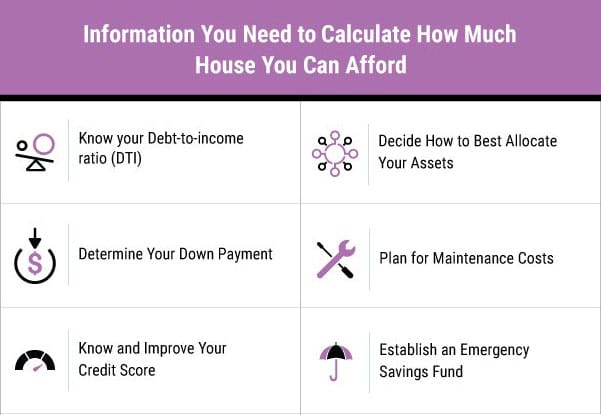
Buying a home is usually the most expensive purchase people make in their lives. It is considered to be a symbol of success which signals to others that you are getting closer to fulfilling the American dream. Knowing that buying a home is a big financial and psychological commitment, finding out how much you can afford should be your number one priority.
To start your home buying journey, you need to be mindful of the following four things:
1) Establish your priorities
Make a list of your ideal home (features, location, type of property, age, square footage)
2) Calculate how much you can afford
- Use the 28% / 36% rule
- Know your debt-to-income ratio (most lenders prefer a DTI under 36%)
- Determine your down payment
- Check your credit score (the higher the score, the lower the rate)
- Use a home affordability calculator
- Consider how to best allocate your assets
3) Plan for expenses
- Home maintenance (gardening, heating, and cooling, etc.)
- Moving costs
4) Have an emergency fund in place
- 3-6 months’ worth of living expenses
- Have 1% to 3% of your home’s value saved for emergency repairs
- Hire a professional to inspect the home you are interested in
Having a plan in place can help you establish priorities. If you have additional debt like student loans, it might be best to see if you can prioritize paying those off first before purchasing a home – Keeping a list is always helpful.

COVID-19 and the Home Buying Process
With COVID-19 still very present in our daily lives, sellers and real estate agents gave started to offer virtual tours.
It is clear that most buyers will prefer an in-person tour before making an offer. Still, virtual tours are a great way for buyers to shop around and find their dream home.
Dana Bull, realtor at Sagan Harborside Sotheby’s International Realty said “most [virtual tours] will include a contingency that allows them to walk away after a home inspection or physical walk through”.
Conclusion
If you are a first-time homebuyer, knowing all of these four things will help with your home buying journey. You will at least have one foot ahead of those who do not have a plan at all.
Focusing on the preparation required to purchase as opposed to the excitement of it can help you stay on budget. “Try to the extent possible to separate emotion and logic,” says Keith Gumbinger, Vice President of HSH.com, an online consumer’s mortgage resource.
Once your plan is ready, it is time to start shopping for mortgage lenders. Some lenders are known for being the “Best for” with various clients such as first-time home buyers, active military members, and veterans.
Read the full article on “Money”.